 Petzlover
Petzlover Catahoula Bulldog is originated from United States but Braque du Bourbonnais is originated from France. Catahoula Bulldog may grow 9 cm / 4 inches higher than Braque du Bourbonnais. Catahoula Bulldog may weigh 21 kg / 47 pounds more than Braque du Bourbonnais. Catahoula Bulldog may live 4 years more than Braque du Bourbonnais. Catahoula Bulldog may have more litter size than Braque du Bourbonnais. Both Catahoula Bulldog and Braque du Bourbonnais requires Low Maintenance.
Catahoula Bulldog is originated from United States but Braque du Bourbonnais is originated from France. Catahoula Bulldog may grow 9 cm / 4 inches higher than Braque du Bourbonnais. Catahoula Bulldog may weigh 21 kg / 47 pounds more than Braque du Bourbonnais. Catahoula Bulldog may live 4 years more than Braque du Bourbonnais. Catahoula Bulldog may have more litter size than Braque du Bourbonnais. Both Catahoula Bulldog and Braque du Bourbonnais requires Low Maintenance.
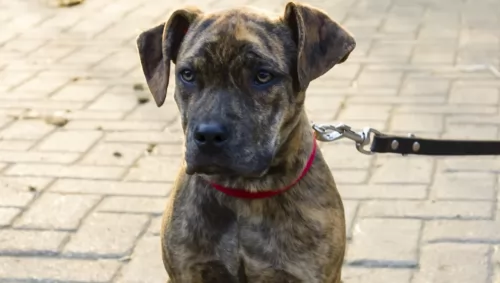 Long ago, ranchers kept the Catahoula Leopard to catch and carry prey, but because it lacked the strength to do so, they would include other stronger dogs in the pack. The American bulldog was more well built, stronger and more aggressive, and the idea was to mix the American Bulldog with the Catahoula Leopard Dog. This brought about the Catahoula Bulldog which has been in existence for some 100 years.
Long ago, ranchers kept the Catahoula Leopard to catch and carry prey, but because it lacked the strength to do so, they would include other stronger dogs in the pack. The American bulldog was more well built, stronger and more aggressive, and the idea was to mix the American Bulldog with the Catahoula Leopard Dog. This brought about the Catahoula Bulldog which has been in existence for some 100 years.
The Catahoula Bulldog became known for its stamina and strength and in 1951 the breed registry started. As a hybrid, the Catahoula Bulldog isn’t officially recognized by the American Kennel Club.
 The Braque du Bourbonnais is an ancient breed, seen in the 15th century in France in the province of Bourbonnais. He became extremely popular with hunters by the 1800’s as a good pointer. He has become very popular in the United States and all of North America. There are often more puppies born in the U.S. than in France. The British call this breed the Bourbonnais Pointing Dog.
The Braque du Bourbonnais is an ancient breed, seen in the 15th century in France in the province of Bourbonnais. He became extremely popular with hunters by the 1800’s as a good pointer. He has become very popular in the United States and all of North America. There are often more puppies born in the U.S. than in France. The British call this breed the Bourbonnais Pointing Dog.
As with so many European hunting and working dogs, the Braque du Bourbonnais almost disappeared following World War I but was saved by the first breed club, established in 1925. Then following World War II, they were again in danger as the club dissolved and birth rates among the breed decreased drastically.
Actually, there were no dogs at all in the French registry between 1963 and 1973. This was attributed to the fact that the registry put more emphasis on the secondary characteristics such as color, length of tail) instead of the hunting characteristics. Because of this some hunter-breeders vowed to bring the real Braque du Bourbonnais back.
Michel Comte took on this task in 1970 but could not find any dogs with pure Bourbonnais blood. So, he took missed breed with characteristics like the Bourbonnais and inbred several litters until he had a dog he was satisfied with. He registered this dog with the LOF in 1973-75. Seeing this several other breeders got into the act and they successfully brought the breed back.
Michel became president of the new Club du Braque du Bourbonnais in 1981 and remained so until 2001. During this time the breed excelled at field trials and was first sent to the U.S. in 1988. The breed is now thriving in both Europe and North America.
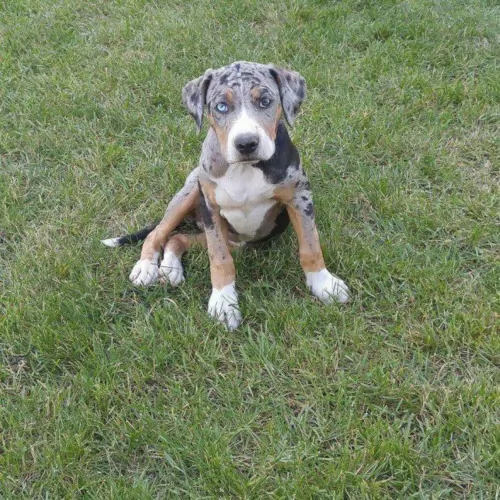 The Catahoula Bulldog is a strong-looking, medium- sized dog of 55-66cm in height and weighing in at 34-46kg. He has a short, smooth, water-repellent coat. The coat can be in a number of colors – white, brown, black or grey or he can be bi-colored such as in brown and black or white and black.
The Catahoula Bulldog is a strong-looking, medium- sized dog of 55-66cm in height and weighing in at 34-46kg. He has a short, smooth, water-repellent coat. The coat can be in a number of colors – white, brown, black or grey or he can be bi-colored such as in brown and black or white and black.
The dog appeals to a lot of people because it sheds very little. The ears of the Catahoula Bulldog are somewhat floppy and the long tail is mostly docked. The dog has unusual eyes and these can be brown, but also in shades of blue or green or even a combination of these colors.
This is a relaxed dog breed but having said that, he is also a protective breed, and then his fearless qualities come out. He becomes alert to strange noises. He is loyal and intelligent and loves to spend time with his human family. He is somewhat stubborn and independent, and early training and socialization should be provided. This ensures he is even more amicable around children in the home as well as around pets.
 This is an elegant breed with a medium sized, muscular bod and a round head. The nose will be the color of the coat and the muzzle is cone shaped with a wide base. He has large dark or hazel eyes, again depending on the color of the coat. The ears can drop below the throat and the neck is very muscular. He has a deep, wide chest and straight, muscular legs. The coat can come in two colors – liver and fawn – and ticked or spotted. They have a typical short pointer type tail.
This is an elegant breed with a medium sized, muscular bod and a round head. The nose will be the color of the coat and the muzzle is cone shaped with a wide base. He has large dark or hazel eyes, again depending on the color of the coat. The ears can drop below the throat and the neck is very muscular. He has a deep, wide chest and straight, muscular legs. The coat can come in two colors – liver and fawn – and ticked or spotted. They have a typical short pointer type tail.
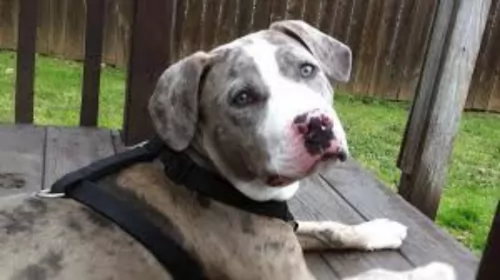 The Catahoula Bulldog is such an all-round dog breed – he loves to work and be active but he also loves to be with his human family. He is smart, active, loving and devoted and makes a splendid working dog or human companion, though he will always need to be kept busy.
The Catahoula Bulldog is such an all-round dog breed – he loves to work and be active but he also loves to be with his human family. He is smart, active, loving and devoted and makes a splendid working dog or human companion, though he will always need to be kept busy.
He is a healthy dog breed too, and is actually low maintenance which is just one of the many advantages of keeping him as a pet.
For all that he offers you, it is up to you as a responsible dog owner to provide him with a loving and nurturing environment so that he can continue to live up to the high standards this dog breed is known for.
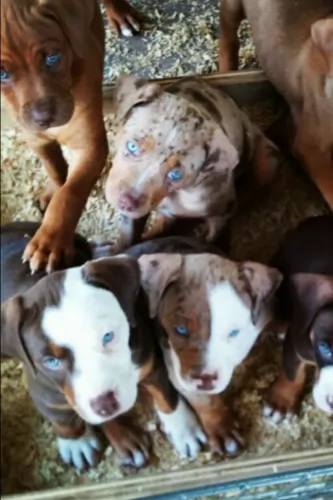 The Catahoula Bulldog is known to be a robust dog breed, full of energy. With good care – healthy diet, clean, fresh water and love and attention – he can live up to be between 10 and 16 years of age.
The Catahoula Bulldog is known to be a robust dog breed, full of energy. With good care – healthy diet, clean, fresh water and love and attention – he can live up to be between 10 and 16 years of age.
However, with every dog breed there will be some common dog ailments to watch for and these include hip dysplasia, some eye disorders and congenital heart defects. Some Catahoula Bulldogs can become deaf in one ear, or blind in one eye.
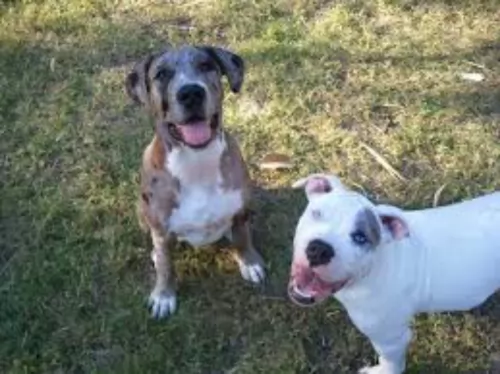 The energy levels of the Catahoula Bulldog are high and he is going to need ongoing mental- and physical stimulation. He wants to be part of all the activities in the family and you will need to take him for walks or take him with you when you go cycling or jogging. He’ll love to join in with all kinds of ball games.
The energy levels of the Catahoula Bulldog are high and he is going to need ongoing mental- and physical stimulation. He wants to be part of all the activities in the family and you will need to take him for walks or take him with you when you go cycling or jogging. He’ll love to join in with all kinds of ball games.
The best kind of environment for the Catahoula Bulldog is a country home with lots of fields to run in, but if you keep him in the city, he can do well provided you make sure to include plenty of daily exercise activities for him.
The short, smooth coat of the Catahoula Bulldog won’t require much grooming, so a good brush twice a week will be excellent for this dog who will just love the interaction this activity brings.
Ensure that your Catahoula and Bulldog mix has food which is full of vitamins and minerals as he is an energetic dog. If you make use of a commercially manufactured product, make sure it is one of the top quality ones guaranteed to ensure good health.
Don’t just put a bowl of dog pellets in front of your dog day after day, but make it interesting and nutritious for your pet by adding in raw meat, rice, vegetables and some cooked meat from time to time. An adult dog can be fed once or twice a day.
 This breed is prone to weight gain and obesity. Be careful not to overfeed them. Don’t free feed them but give them 2-3 smaller meals per day.
This breed is prone to weight gain and obesity. Be careful not to overfeed them. Don’t free feed them but give them 2-3 smaller meals per day.
Entropion - both of these are issues with eyelashes turning inward or outward and both can
Pulmonic Stenosis of the heart- minor will have no symptoms but eventually the heart will not be able to function efficiently and could lead to congestive heart failure.
The Braque du Bourbonnais needs at least a minimum amount of exercise daily , especially if he is not used for hunting. A fenced backyard for playtime would be perfect but long walks will work. He likes to learn tricks, play ball or hide and seek. Outside activities could include hiking, swimming, agility, retrieving, rally and obedience trials, along with the usual field trials.